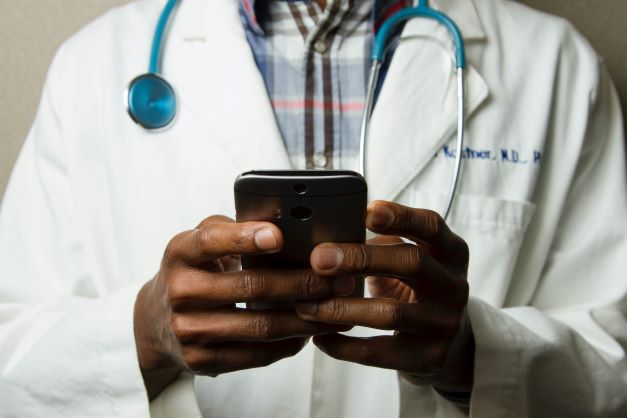Integrating Digital into Local Pathways

August 11 2021 | By Emily Bromiley
Digital healthcare tools have become vital in supporting public health and helping teams to work together. A UK survey conducted by Statista in March 2020 revealed that 58% of respondents would consider using digital services to help limit the spread of Covid-19. Accounting for public fears over the virus, there was already an increase in the use of digital systems before the pandemic began. Locked inside for long periods, the public have turned towards digital tools to help stay connected and manage their mental health. Healthcare providers have been watching and adapting.
Digital and the move to integrated healthcare
Integrated care systems (ICSs) aim to coordinate healthcare needs across wider areas. The desire to strengthen the relationships between the NHS, local authorities and other strategic partners is admirable. However, questions have risen over how partnerships can collaborate and work together with local healthcare services and providers. Digital tools have a part to play in this.
Can digital tools increase collaboration between local healthcare services and ICS partnerships?
The benefits of digital healthcare tools have been made clearer via the Covid-19 pandemic. Healthcare professionals and local authorities have utilised digital platforms in innovative ways including:
- Allowing GPs to conduct first stage patient assessments via online video conference.
- Digital tools to allow mental health support and treatments to continue when people are physically isolated.
- Digital apps empowering researchers to gather and share vast amounts of healthcare data leading to faster breakthroughs in virus analysis, vaccine development, and better patient care (e.g. C-19 Symptom study by ZOE).
- Enabling communication and collaboration to continue throughout the UK between different healthcare providers, CCGs and local populations under challenging circumstances.
Digital can help build pathways to closer collaboration, but it works best when used as one tool amongst many.
Finding new ways to collaborate and integrate
The ambition of the new ICS healthcare model is to bring providers together across a larger region. Every commissioner, public health team and local healthcare provider recognises the need to work together. However, commissioning services for a regional area of 2 million people is very different to commissioning services for a local population of 200,000. Different healthcare needs, require different pathways. The challenge is to find regional solutions without overlooking the more personalised care approach that local pathways provide.
How digital tools can support mental healthcare integration
Public health commissioners and local providers are passionate about delivering the best services they can to the local population. Key to their strategy is empowering patients to have more choice in how they access and receive healthcare. Digital helps support patient choice by giving commissioners a wider range of services for patients to choose from.
Providing more digital choices, particularly with mental healthcare, means being able to offer things like:
- Instant access to a support service 24/7.
- Providing anonymous mental health support options.
- Offering self-referral routes to patients who want more control over how they engage with services.
- Peer-to-peer support at any time of the day or night.
Digital tools support an integrated system that flexes to individual patient need. Digital tools can also be attractive for commissioners and local providers as they often provide a high-scale and lower cost-per-patient choice.
What about face-to-face healthcare services?
The purpose of digital healthcare tools is to augment traditional proven services. Digital services can offer patients a secure environment in which to get support and receive some treatments. The same safeguarding protocols must be in place, but this is possible with forums and conversations being securely monitored by clinical supervision. Digital services can be particularly effective for patients who can’t or won’t access mental health services via traditional avenues.
Joined up pathways beyond a healthcare environment
Many commissioners and healthcare providers understand that serving the healthcare needs of a population, is not limited to a healthcare environment.
“This is about the [mental illness] prevention revolution happening with employers, happening with schools, happening in early years, happening in criminal justice. The leadership for this agenda needs to go beyond the leaderships that we’ve defined, and allowed mental health to be defined by in relation to mental health care.”
Gregor Henderson, Director of Mental Health & Strategic Adviser for Public Health at Public Health England 2013-2021
Speaking at The King’s Fund as they discussed the challenges of promoting good mental health across the UK population, 2015.
One example of healthcare going beyond local provision can be found in Glasgow. The Educational Psychological Service department at Glasgow City Council became the first to invest in Togetherall – a digital platform to support the mental health of every 16-18-year-old living in the city. Following the success of the pilot scheme, the council decided to roll out the platform to include everyone up to the age of 24. The platform offers young people an opportunity to talk about their mental health concerns openly and anonymously with their peers in a secure online environment. They are referred in either by a GP or by a social prescriber including local charities and other third sector organisations.
The clinical supervision of the platform has already prevented 1 suicide in Glasgow. The success has also enabled local schools to feel confident in discussing mental health, and encouraging students to talk about how they are feeling.
Digital healthcare tools are proving successful in Glasgow’s strategy, but they are only part of a wider healthcare integration solution. The Togetherall platform works alongside a range of initiatives designed to support the needs of different communities. These include:
- ‘Living Works’ – a mental health programme for educators
- ‘Short films on Mental Health & Suicide Prevention’ – St Andrew’s Secondary
- Mental Health First Aid Training for educators and staff
The role of digital in future collaborations
Digital has a role to play in helping healthcare providers, CCGs and other services remain connected. Platforms like Togetherall, can link up with multiple local mental health services. This will help to provide integration beyond the healthcare system and facilitate closer collaboration. Local choice and service provision will always remain connected to the wider system. Advocating the role of digital in local services is not to promote one over the other.
The role of digital is not to replace proven healthcare systems. The role of digital is to augment them. Digital can help offer patients more choices on their healthcare needs. In an integrated care system with patient choice at its heart, digital is a useful chamber to have.
Find out more about Togetherall’s work with ICS and healthcare commissioners.








